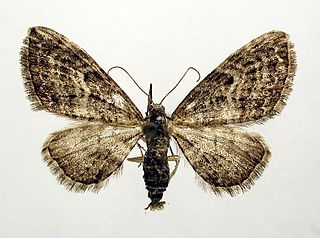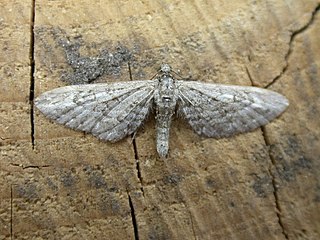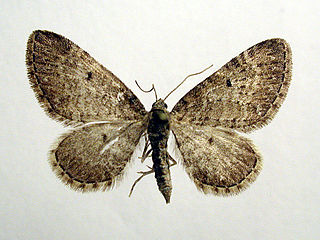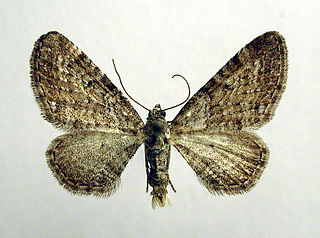
Eupithecia is a large genus of moths of the family Geometridae. There are hundreds of described species, found in all parts of the world, and new species are discovered on a regular basis.

The lime-speck pug is a moth of the family Geometridae. It is a common species throughout the Palearctic region, the Near East and North Africa.

The juniper pug or juniper looper is a moth of the family Geometridae. The species was first described by Michael Denis and Ignaz Schiffermüller in 1775. It is found throughout the Palearctic and in the Nearctic.

Abrictosaurus is a genus of heterodontosaurid dinosaur that lived during the Early Jurassic in what is now southern Africa. It was a bipedal herbivore or omnivore and was one of the most basal heterodontosaurids. It was approximately 1.2 metres (3.9 ft) long and weighed between 0.68 and 3 kilograms.
Cortal Consors SA was a European broker in personal investing and online trading.

Laosaurus is a genus of neornithischian dinosaur. The type species, Laosaurus celer, was first described by O.C. Marsh in 1878 from remains from the Oxfordian-Tithonian-age Upper Jurassic Morrison Formation of Wyoming. The validity of this genus is doubtful because it is based on fragmentary fossils. A second species from the Morrison Formation, L. gracilis, and a species from the late Cretaceous of Alberta, Laosaurus minimus, are also considered dubious.

Nanosaurus is the name given to a genus of neornithischian dinosaur that lived about 155 to 148 million years ago, during the Late Jurassic-age. Its fossils are known from the Morrison Formation of the south-western United States. The type and only species, Nanosaurus agilis, was described and named by Othniel Charles Marsh in 1877. The taxon has a complicated taxonomic history, largely the work of Marsh and Peter M. Galton, involving the genera Laosaurus, Hallopus, Drinker, Othnielia, and Othnielosaurus, the latter three now being considered to be synonyms of Nanosaurus. It had historically been classified as a hypsilophodont or fabrosaur, types of generalized small bipedal herbivore, but more recent research has abandoned these groupings as paraphyletic and Nanosaurus is today considered a basal member of Neornithischia.

The larch pug is a moth of the family Geometridae. The species can be found in Europe, the Ural Mountains, West and Central Siberia, the Altai Mountains, Transbaikalia, Yakutia, the Far East, Mongolia, Korea, Japan and in North America, from Yukon and Newfoundland to New York and Arizona.

Eupithecia nanata, the narrow-winged pug, is a moth of the family Geometridae. The species was first described by Jacob Hübner in 1813. It can be found all over Europe including Russia and Ukraine. In the Alps it occurs up to 2,200 metres (7,200 ft) above sea level and in the Pyrenees to 2400 meters. The species prefers dry or boggy heathlands.

Gyroscala lamellosa, common name : the lamellose wentletrap, is a species of medium-sized predatory sea snail, a marine gastropod mollusc in the family Epitoniidae, the wentletraps.

Eupithecia venosata, the netted pug, is a moth of the family Geometridae. It was first described by Johan Christian Fabricius in 1787. It is found across the Palearctic realm from Portugal and Morocco in the west to the Lake Baikal in Siberia and Afghanistan and Pakistan in the east.

Catocala consors, the consort underwing, is a moth of the family Erebidae. It is found from Maine and Connecticut south to Florida and west to Texas and eastern Oklahoma.

Glenn Consor is an American-Israeli National Basketball Association (NBA) and NCAA basketball analyst and studio host who played collegiate and pro basketball. He was also an NBA scout, which led to his broadcasting career. He played professional basketball for Maccabi Haifa in the Israeli Premier Basketball League.

Eupithecia satyrata, the satyr pug, is a species of moth of the family Geometridae. It was described by Jacob Hübner in 1813. It is found from Ireland, through northern and central Europe east to all of Russia and central Asia and western Siberia to Tibet. It is also present in North Africa and North America.

Conus consors, common name the singed cone, is a species of sea snail, a marine gastropod mollusk in the family Conidae, the cone snails and their allies.
Oxymeris consors is a species of sea snail, a marine gastropod mollusc in the family Terebridae, the auger snails.

Eupithecia pernotata, or Guenée's pug, is a moth of the family Geometridae. The species was first described by Achille Guenée in 1857. It is known from the Alps, through Romania to southern Russia. It is also found in Finland.

Trachycardium is a genus of molluscs in the family Cardiidae.

Eupithecia quadripunctata is a moth in the family Geometridae. It is found in India, Pakistan, Nepal, Russia, China, Taiwan, Korea, Japan and northern Thailand.
Eupithecia variostrigata is a moth in the family Geometridae. It is widespread in the western Palearctic realm, ranging from Spain to the western Pamirs in the east.















